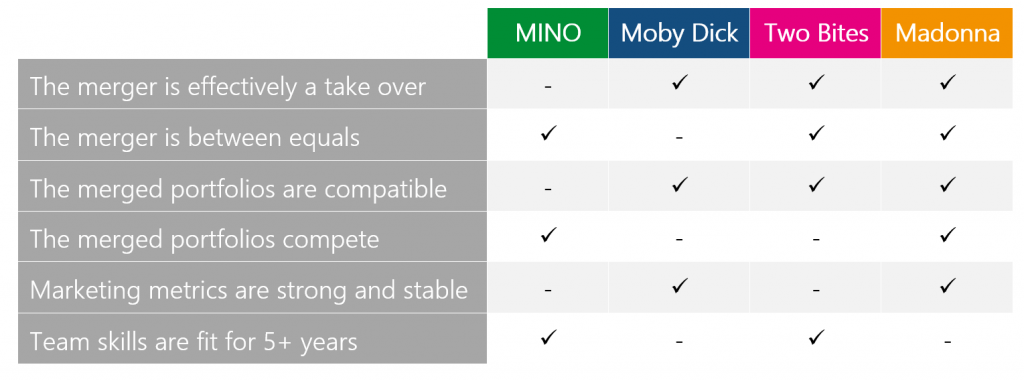Since 1985, more than 325,000 mergers and acquisitions transactions have been announced in the USA with a known value of almost $35 billion. In the first 6 months of 2019 alone 4,560 M&A were announced, worth $787 million.
It’s more than likely that you will be part of a merger at some point of your career. If you’re a senior marketer when that happens to you, what are your options for combining the marketing teams from both merged companies and how will you make that merging as successful as possible?
4 ‘What’ Options
If you’re a marketer in the middle of a Merger & Acquisition, how should you approach the merger of two marketing teams? In our experience you have 4 options:

MINO (Merger in Name Only)
Continue to run the two marketing teams as separate entities, with little or no significant change to the way they work.

MOBY DICK
One team completely swallows the other, with members of the ‘krill’ team adopting the structure and ways of working of the ‘whale’ team, in their entirety.

TWO BITES AT THE CHERRY
For the first bite, both teams are brought together physically, with the minimum necessary imposition of changes to structure ways of working. This allows the teams to get to know each other and you to get to know them, before taking the second, bigger bite when the merged teams adopt a new structure and ways of working that reflects the very best of both.

MADONNA
In this approach, the opportunity is taken to completely reinvent the marketing team (much like Madonna at the turn of the century), essentially creating the team structure, ways of working and culture from scratch, merging only those elements of the marketing teams that happen to fit the transformed team design – everything else goes.
So which option is right for your merger? Well, it depends on a number of considerations, a combination of which will make a particular option stand out.

Great, so the what is decided on. Which leads nicely to confirming how this is going to happen.
7 ‘How’ Considerations

START WITH THE CONSUMER
Look at what the consumer demands of their brands and your business. Your marketing department must be shaped around what the consumer needs to experience. The same rule applies to a merged marketing team – now might be the time to make this happen.

LET BRAND STRATEGY LEAD
Do the work on what brands will be maintained and prioritised before you start to reorganise. Let strategy lead form and function.

FOCUS ON THE FUTURE
Reorganising can be painful and distracting. You only want to have to do it infrequently. Design your merged team for what you ultimately want it to do in three years’ time; leapfrog the competition, minimise disruption (unless you take the 2 Bites of the Cherry option)

CONSOLIDATE FOR SCALE AND CONSISTENCY
Where there is a clear advantage of consolidating structures due to economies of scale, do so. This applies internally in marketing organisations as well as externally with suppliers. These are often the more functional areas of the business. Where there is an advantage of consistency, in areas like technology, customer data and contact, analytics, these too may be good candidates for consolidated functions.

CONSIDER TECHNOLOGY
Look at how technology can drive effectiveness and efficiency. Very often marketing organisations can gain benefits from better digital enablement. Do consider what Martech is a dependency or an enabler of change and changed marketing organisations.

BUILD A CULTURE, NOT AN ORG CHART
It is very useful to start to describe a merged marketing organisation as a culture; what it believes, how it thinks, how its acts and behaves, how it learns, how it grows. Described in this human way the marketing organisation can be flushed out with appropriate skills, learning and development programs, and processes rather than purely being built on an org chart.

STEAL WITH PRIDE
It is well worth having benchmark work, or KPI’s, or benchmark companies for each marketing function. It will help manage reality and expectation. World class marketing needs world class people. Often in M&A driven reorganisation cost is the driver, not the work.
Conclusion
M&A’s are almost as much a certainty as death and taxes – it’s not if but when it happens to you and your business.
When it does happen, act quickly to work out what your approach will be, based on consideration of the key aspects of the M&A. Then apply the relevant how’s to ensure your approach is as quick and smooth as possible, successfully delivering the desired outcomes of the merger. When the dust has settled you want your team to be part of the 10% of M&A that succeed.



